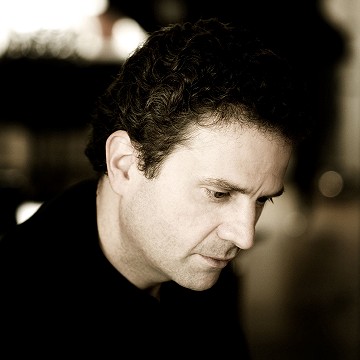Haefliger’s keyboard artistry at its finest in Mozart
Pianist Andreas Haefliger presented a single encore—Mozart’s Adagio in B Minor—for his recital at Orchestra Hall on Sunday. He partially explained this choice by saying it “encapsulated” the whole program that had preceded it, namely two 1783 Mozart sonatas, the Liszt transcription of Wagner’s Liebstod and the great Schubert Sonata in B-flat (D.960).
Whether this was to have Mozart operate as an alternating counterpoint or for the introspective Adagio to balance out the sunnier Mozart sonatas, this logical postlude made for a highly satisfying, unrushed encore worthy of the inspired music making that came before it.
In fact, even with the Schubert and Liszt pieces included as built-in audience pleasers, the Swiss pianist’s Mozart stole the show. He supplies a substantial weight to this music but doesn’t needlessly modernize it. With the Piano Sonata in C (K. 330), a booming low octave seemed to carry the buoyant melodies on its wave. And while Haefliger is certainly a cerebral pianist, he downplays his studiousness: In the popular A Major Sonata, K. 331, the infectious melodies ambled along as if he were only just discovering them.
He briskly dispatched the famous Rondo alla turca to make you appreciate just how inarticulate are most student versions. How often is Mozart played so transparently and yet with such muscle? Visually, it was interesting to see how stolid and even robotic of a performer he appears, but this says nothing of the results.
He was generously soulful in Liszt’s lavish retooling of Wagner’s tragic Liebestod. As the richly sonorous tableaux gave way to those big, sad climactic chords, the hacking audience seemed quieted under its spell. Only adding to this mystical effect was Haefliger’s nearly minute-long moment of silence as the final notes subsided. This was one of the very last works Vladimir Horowitz chose to record, and Haefliger was convincing in communicating the work’s timeless allure.
If there was a minor quibble Sunday, it was the motorized start to Schubert’s B-flat Sonata. The dreamy serenity of the opening felt stripped of its mystery. But once the rest of the sonata bloomed more gracefully out into the open, Haefliger was in the Schubertian zone. From the moonglow of the Andante to the bustling concision of the finale, this performance of the overplayed sonata was fresh and alive.
Posted in Performances





